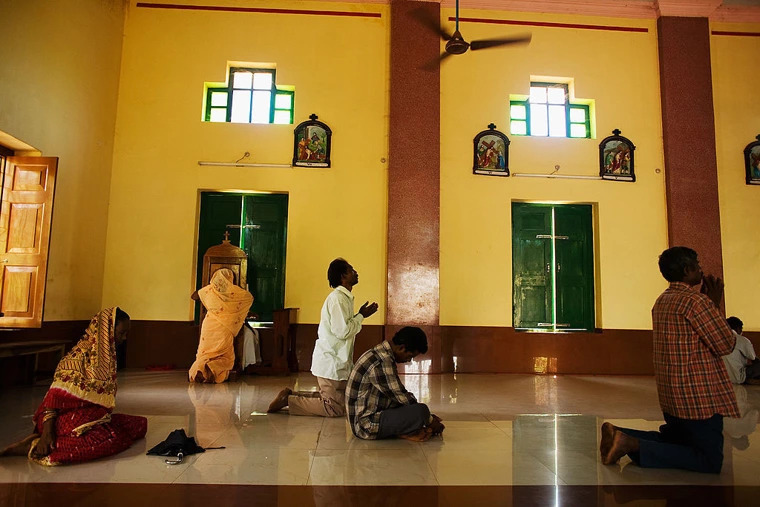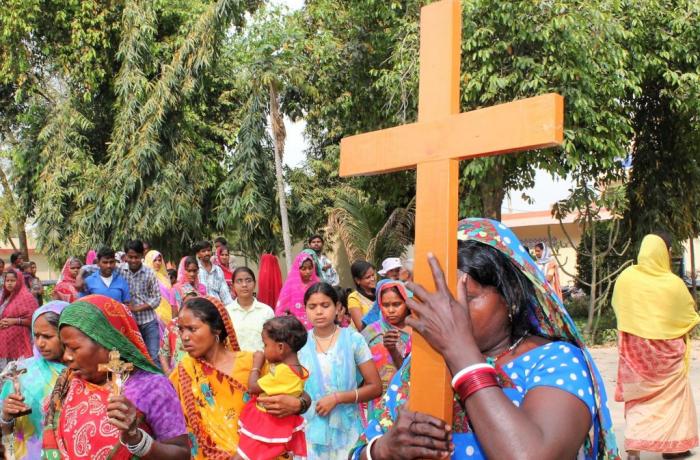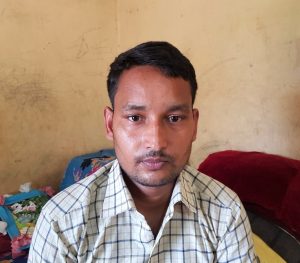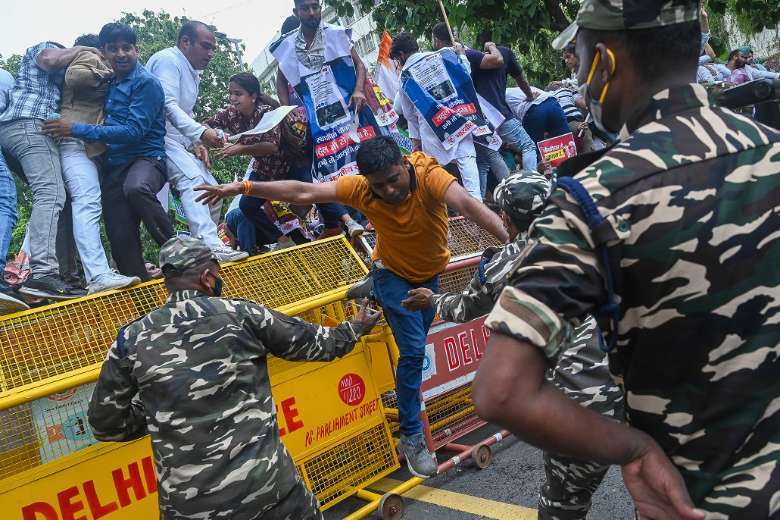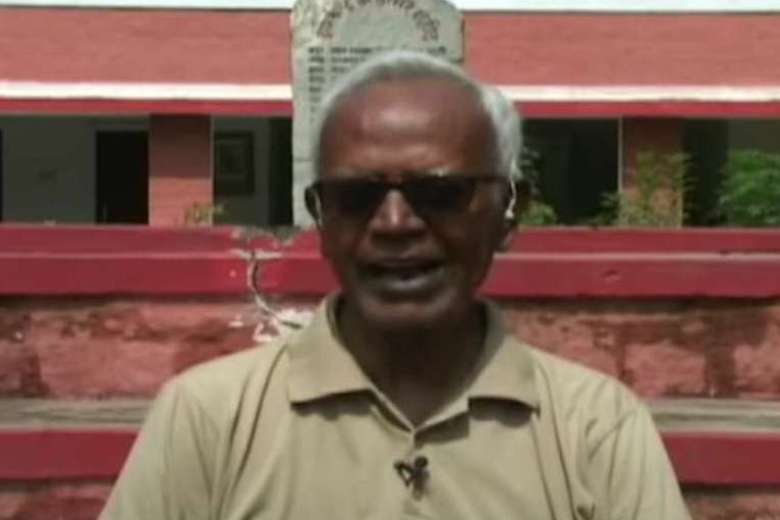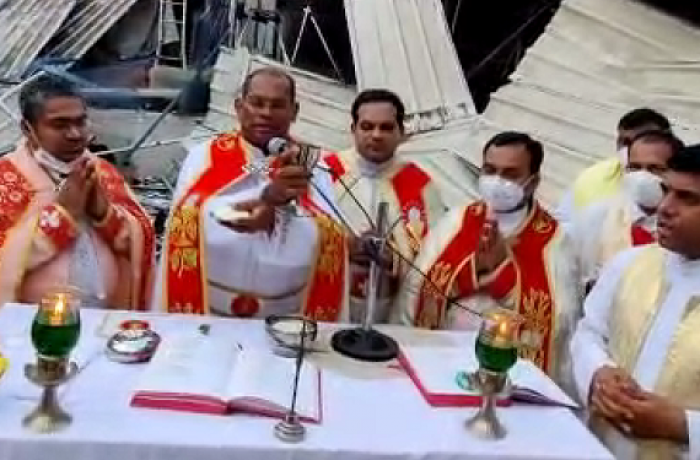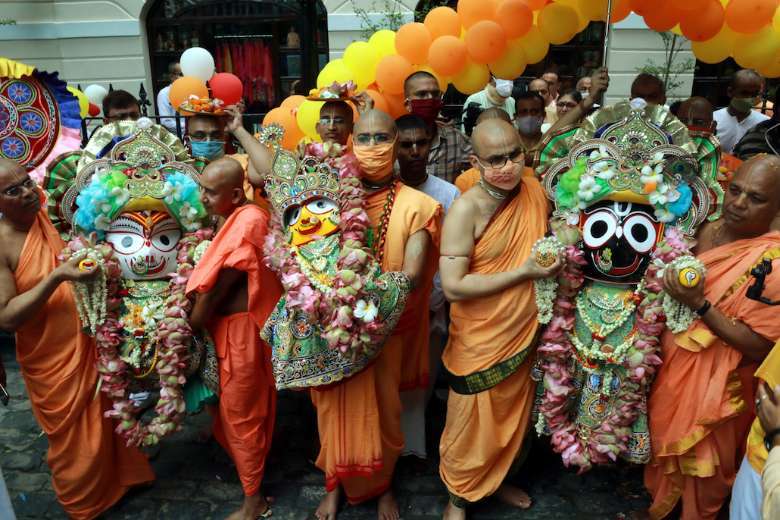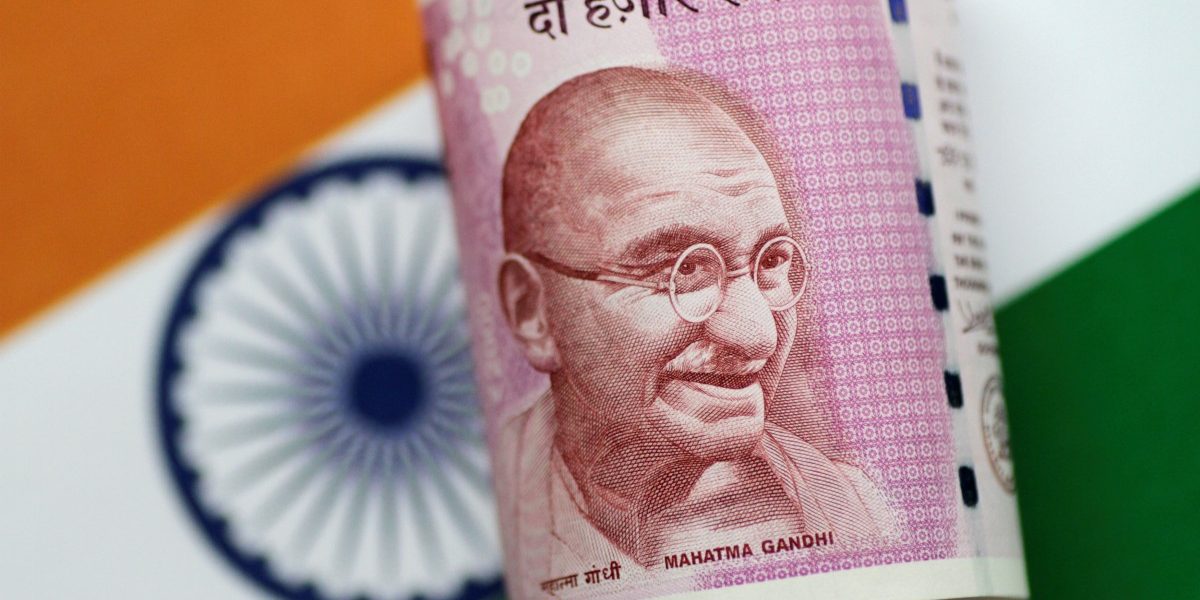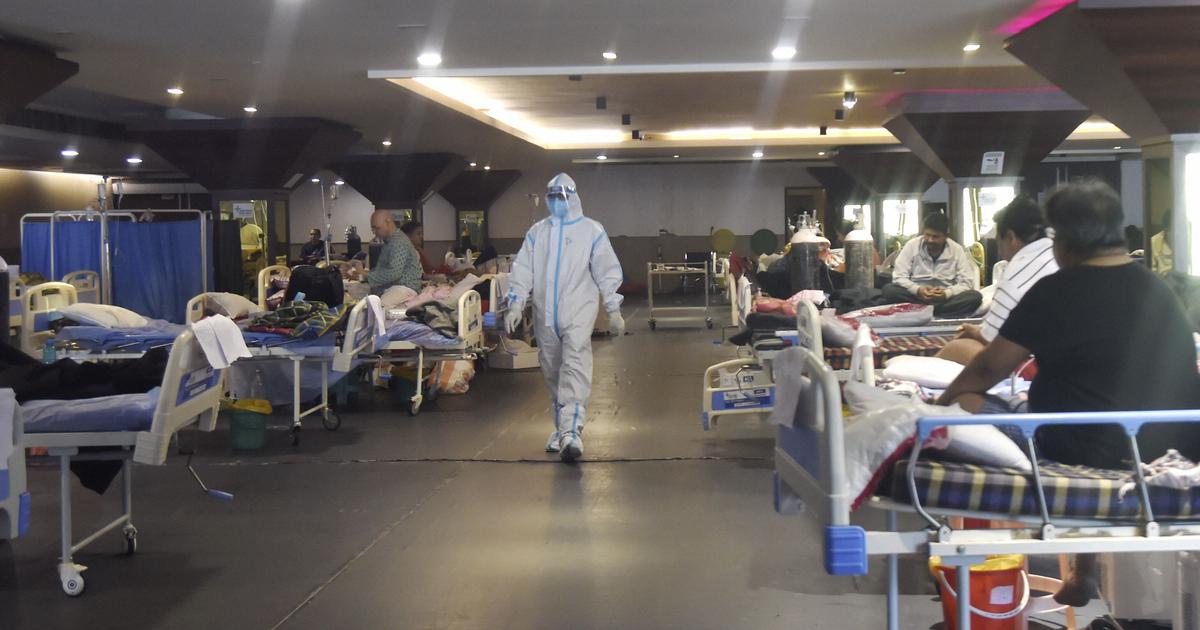Pastor in India forced to flee his home after enduring ‘merciless torture’ by police
A pastor in northern India was forced to flee his village after police detained him, his wife and three children, one of whom is 2 years old, and tortured him for sharing the Gospel.Pastor Sanjay Kumar Bharati and his family moved more than 600 miles away from his village in Shyampur area of Uttarakhand state’s Haridwar district, Morning Star News reported, adding that police had unofficially ordered him to leave the village.Bharati and his family were detained on June 13 on a complaint of violating COVID-19 restrictions. But as they tortured him, police only interrogated him about his conversion to Christianity and his preaching of the Gospel.“As soon as I was taken inside the police station, a policeman slapped me three or four times on my face and punched me in my stomach,” the pastor was quoted as saying. “He hurled curses and accused me of alluring people and converting them.”Bharati recalled that he was then taken to an inner room where he was ordered to lie face down on a bed. An officer then beat him on his legs and feet with his belt.“Hell broke open on me as they mercilessly tortured me for 30 to 40 minutes. I
Some 30 Christians arrested under Uttar Pradesh’s anti-conversion law
The law criminalises religious conversion, except in the case of "Ghar Wapsi", the reconversion to Hinduism. According to a report by International Christian Concern, 30 Christians were arrested in July, up from previous months.Police recently arrested nine Christians in Uttar Pradesh for allegedly violating the state’s controversial anti-conversion law, which criminalises religious conversion and denies bail to those accused.The case is cited in a study by International Christian Concern (ICC), a Christian advocacy group, which reports a recent rise in anti-Christian complaints.The document quotes one of the Christians, Sadhu Srinivas Gautham, who said that about 25 Hindu radicals stormed a prayer meeting last Sunday in Gangapur town, accusing those present of forcibly converting Hindus to Christianity.“They raged against me,” Gautham said. “It was as if they wanted to kill me on the spot. However, police arrived and escorted us to the police station” where he and six other Christians were charged with violating the anti-conversion law. “They told us we should renounce our Christian faith and go back to Hinduism."According to the anti-conversion law, approved last February, “Ghar Wapsi” (homecoming), the reconversion to Hinduism, is not forced conversion, even if it is often accompanied by threats and intimidation.According to the
Pastor in India Driven from Home after Police Torture, Threats
Officers arrive with news reporter, reviling him and Christianity.A pastor in northern India was forced to leave his village and flee with his family more than 600 miles away after police last month tortured and threatened him, he said.Officers in Uttarakhand state on June 13 arrested pastor Sanjay Kumar Bharati, his wife, children and several members of his church in Shyampur, Haridwar District on a complaint of violating COVID-19 restrictions, but as police were beating him their questions and accusations concerned only conversion to Christianity, he said.Pastor Bharti said officers began beating him as soon as he entered the Shyampur police station. Reviling him and Christianity, they interrogated him as they continued to hit him, he said.“As soon as I was taken inside the police station, a policeman slapped me three or four times on my face and punched me in my stomach,” Pastor Bharati told Morning Star News. “He hurled curses and accused me of alluring people and converting them.”They then took him to an inner room, where they made him lie on a bed. One of the officers removed his leather belt and began to strike him on his legs and feet, he said.“Hell broke open on me
Indian bishop condemns Pegasus spying scandal
Bishop Lobo says alleged government snooping on citizens is 'completely unethical'Media reports claim that Israel-made spyware Pegasus was believed to have been used to track more than 300 Indian phone numbers including those of journalists, politicians, government officials and rights activists.The Israeli cyberweapon company NSO Group was also fined in 2019 for hacking phones of around 1,400 users around the world, including 121 Indians.“It is completely unethical as we have the fundamental right to privacy given by the constitution of India and spying on someone’s private life is a threat to the citizens of a democratic country,” Bishop Salvadore Lobo of Baruipur, chairman of the Catholic Bishops’ Conference of India’s office of social communications, told UCA News.“We can understand when the government sometimes spies on some social elements when it thinks that they pose a threat to national security, but targeting only some particular group or person is unacceptable and the government should investigate the latest issue. Read More
Judges pay tribute to Indian Jesuit’s service
Bombay High Court commends the late priest's work for society while hearing his bail application posthumouslyBombay High Court has expressed “great respect” for the work done by Indian Jesuit priest Stan Swamy, who died in custody on July 5.The 84-year-old, who suffered from Parkinson’s disease, hearing impairment and other age-related ailments, never recovered from the hardships of being confined in a jail without basic services.Justice S.S. Shinde and Justice N.J. Jamadar of the top court in the western state of Maharashtra were hearing the late priest’s bail appeal posthumously on July 19“We don’t have time normally, but I saw the funeral service [of Father Swamy]. It was very gracious,” Justice Shinde said.“He is such a wonderful person. The kind of service he has rendered to the society. We have great respect for his work. Legally, whatever is there against him is a different matter.”The judges also tried to counter criticism of the judicial system and the National Investigation Agency (NIA), a federal anti-terror body that arrested Father Swamy, for repeatedly denying the priest’s bail applications on medical grounds. Read More
Delhi, Syro-Malabars pray amidst the rubble of a destroyed church (VIDEO)
The Syro-Malabar diocese of Faridabad has appealed to the Indian Prime Minister Narendra Modi to pave the way for the reconstruction of the Little Flower Church in New Delhi, which was demolished last July 12 because it was considered unauthorised despite the fact that it had been operating for almost 15 years."We call on you to intervene immediately," writes Bishop Kuriakose Bharanikulangara, "to rebuild and restore the damage caused to the faithful in this place of prayer, which they devastated without any respect". At the same time, the diocese has also approached the National Commission for Minorities on the issue, while - as the video shows - the community continues to gather to pray amidst the rubble.Kerala's local government chief Pinarayi Vijayanha also said he was shocked by the demolition. "Something like this should not have happened, we will see what can be done about it," he said. Meanwhile, in Delhi, there is a back-and-forth over who ordered the demolition. The Delhi Development Authority, a federal government body, denies responsibility.The eviction notice to the "illegal encroachers" was allegedly issued by the Block Development Officer of the South Delhi district, which is under the local government's tax office. The notice, dated
Religious conversion in India: More smoke than fire now?
THE AGE-OLD DEBATE ON CONVERSION CONTINUES WITH THE SAME PASSION, TONE AND ARGUMENT EVEN TODAY An upper-caste Hindu boy, Narayan Sesadri Parlikar, joined a school run by the Church of Scotland in Bombay way back in 1838. Five years later in 1843, he converted to become a Christian. The Bombay Courier, the leading English daily of the time, published a column-length story on Parlikar’s conversion, triggering a major upheaval among the city's upper-caste Hindu society. The day after his conversion, the outraged members of the Brahmin priestly caste to whom the boy belonged, passed a resolution censuring the event. “The missionaries of Christian faith … distribute books on their dharma (religion). In order to facilitate their efforts, they have established schools. For the sake of education, Hindu boys join their schools. The boys are immature in their understanding of Hindu dharma. Their minds become confused, and many have been converted to Christianity,” the resolution said. The 19th-century debate on religious conversion continues with the same passion, tone, and argument even today. The parties in the debate haven’t progressed much in understanding each other’s claims on the contentious issue of conversion that keeps surfacing in politics, media and courts. Those who want to outlaw conversion argue that
MHA Refuses to Reveal Why FCRA Was Amended, Even as Changes Impair NGOs’ COVID Aid Efforts
Even as non-government organisations (NGOs) face severe fund shortages due to changes in the Foreign Contribution Regulation Act (FCRA) effected by the Centre last year – which has adversely impacted their ability to reach out to the poor and marginalised in both rural and urban areas during the second wave of the coronavirus in India – the Centre has repeatedly thwarted attempts by Right to Information (RTI) activists to access details surrounding the reasons why the Act was amended.The Wire had last year reported that leading NGOs believed that changes to the FCRA would deal a crushing blow to the voluntary sector and impact its ability to collaborate and conduct research.They argued that the changes effected through the Foreign Contribution (Regulation) Amendment Bill, 2020 would severely impact collaborative research in critical fields in India as organisations receiving foreign funds will no longer be able to transfer them to smaller NGOs working at the grassroots level.They also said the Bill would initially impact the livelihoods of workers associated with these small NGOs and ultimately lead to the “killing” of the entire sector as caps on administrative expenses would make it impossible for even the bigger NGOs to perform. Read More
Coronavirus: India records 3,11,170 new cases, 4,077 deaths in a day.
The number of active cases stood at 36,18,458, while the recoveries climb to 2,07,95,335.India registered 3,11,170 new coronavirus cases on Sunday, pushing the country’s tally of infections since the pandemic began to 2,46,84,077. The toll rose by 4,077 to 2,70,284.Globally, the coronavirus has now infected 16.22 crore people and killed over 33.65 lakh since the pandemic broke out in December 2019, according to Johns Hopkins University.The national helpline number is 011-23978046, and the toll-free number is 1075. Read More
Hindu Extremists Pressure Convert to File False Charge against Pastor in India, Sources Say
A pastor is facing criminal charges in northern India even though the complainant later denied allegations against the church leader of luring him to convert, sources said. Police in Rupaidiha village, Uttar Pradesh state on Jan. 28 arrested 40-year-old pastor Dharmendra Singh on a charge of “alluring to convert” and two related charges – outraging religious feelings and promoting enmity. He was released on bail on Jan. 31. Pastor Singh denied all charges against him, saying members of the Hindu extremist Vishwa Hindu Parishad and Bajrang Dal fabricated a story and pressured a new Christian, Ramesh Gautam, to file a false complaint against him. Gautam said in court on Jan. 30 that the allegations were false, the pastor said. “He witnessed that his faith is his own choice and nobody has forced him or his family to believe in Jesus,” Pastor Singh told Morning Star News. “‘We have not converted by allurement but have become worshippers of Jesus,’ said Ramesh in the courtroom.” Pastor Singh leads a church in Nepalganj, Nepal, where he resides just across the India-Nepal border, but he regularly visits the Indian village of Rupaidiha, Bahraich District, to lead the new fellowship there where Gautam worships. Gautam and other members of his family put





